Kevin Clarke
Operetta Research Center
23 October, 2014
Opera in the UK doesn’t only happen in big London theatres with rob-the-bank ticket prices. All over the country there are touring companies using their ingenuity to bring classic and contemporary productions to venues from Bury to Banff, writes Robert Thicknesse in his recent article “Opera On The Road.” We caught up with the founder of one such road company, Opera della Luna, which is devoted to the “crazy” side of musical theater. In productions true “lunatics” can enjoy. Here is what Jeff Clarke has to say about operetta in Great Britain and his company’s approach to the art form.
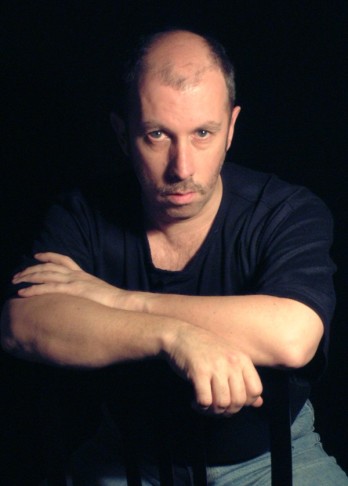
Opera della Luna founder Jeff Clarke.
You founded an opera company in the UK 20 years ago, devoted to operetta, opera bouffe and opera comique. Are there not enough companies in Britain performing this repertoire?
Well, that’s almost true. If I am strictly truthful, when we founded the company it wasn’t intended to be restricted to comic opera and operetta. The principles of the company that we founded in 1994 were two-fold: a) that we performed a repertory that the main funded companies avoided – operas with dialogue, ballad operas, masques, melodramas etc; b) that we used a company that comprised actors who sing as well as trained singers with excellent acting skills. The latter definition was perhaps the more important. A third qualification was that the company was small, of chamber proportions. We have no chorus and usually have between 7 to 10 people on stage and a similar number in the pit. What transpired was that the company quickly grew into a company that specialized in the comic repertory; whose repertoire embraced operetta as well as Gilbert & Sullivan and classical comic opera.
I am very proud of the fact that we perform Haydn and Mozart (“Il Mondo della Luna” and “Don Giovanni”) as well as Lehar and Strauss.
To answer the second part of your question: At the time we set the company up there were no other companies doing this work on a permanent basis. All the main companies like ENO and WNO occasionally include a G&S or a Fledermaus in their seasons, but they perform them in large houses with opera singers, not with singing actors in the sort of sized theatres for which they were originally written.
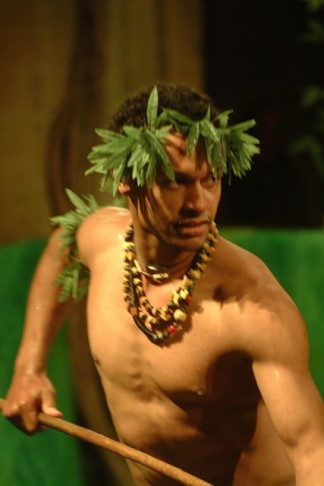
Scene from Opera della Luna’s Offenbach production of “Robinson Crusoe,” with a Tamayo Warrior.
There is no dedicated house or company in Britain (other than ourselves) specializing in the comic repertory; in London we have no Opéra Comique, Komische Oper or Volksoper. There are two larger companies: D’Oyly Carte and Carl Rosa which now only perform very occasionally and are primarily dedicated to G&S. Both have had severe financial issues. D’Oyly Carte now co-produce with Scottish Opera and tour a G&S show once every 2 or 3 years, and Carl Rosa have virtually folded.
What do UK audiences generally expect when they hear the word “operetta”?
I suspect a lot of them expect frilly ball gowns, lots of songs about champagne, and lots of giggling. We have a very strong amateur operatic tradition in this country. Every decent sized town will have its amateur operatic society. Nowadays they tend to do The Producers, Anything Goes or 42nd Street, but for years their staple diet was operetta, and they did them in a very conservative, respectable, “glamorous” way, based – I suppose – on the way a lot of the operettas were presented by Hollywood.
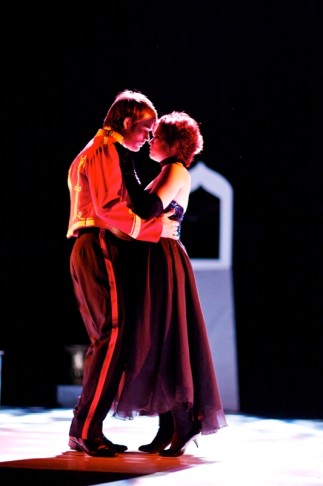
Trevor Jary and Rhona McKail as Danilo and Hanna in Lehár’s “Merry Widow.” (Photo: Opera della Luna)
What do you offer them?
Our approach is always to go back to the original, discount traditions and expectations and try to look at the piece as though it has never been done before. For instance, Hanna Glawari is always played as though she is someone like the “Marschallin”: too old, too posh and usually too large. The script tells us that she is a farm girl, or at least a country girl. Danilo originally didn’t marry her because she was not of sufficient social standing and his uncle would have cut off his inheritance had he done so. Nowhere are we ever told that she went to finishing school and suddenly acquired manners and poise. She was a gold-digger. Married an 80 year old finance minister and probably killed him off with too much energetic sex. The fun about the show is playing her as still common, rude and vulgar, but now of course immensely wealthy. But I have never seen her played this way, certainly not in Britain. What emerged was a very funny piece about real people, not a shallow confection of operetta cliché.
“The Merry Widow” was made an international hit, not by the Vienna production, but by Georges Edwardes production in London.
Hanna was played by a 21 year old musical comedy ingénue, Lily Elsie, and Danilo by a dancing matinee idol, Joseph Coyne with a very limited vocal talent. Yet they were both beautiful and sexy on stage. No matter how well the show is sung, if those two leads don’t sparkle and fizz with sexual energy the show doesn’t work.
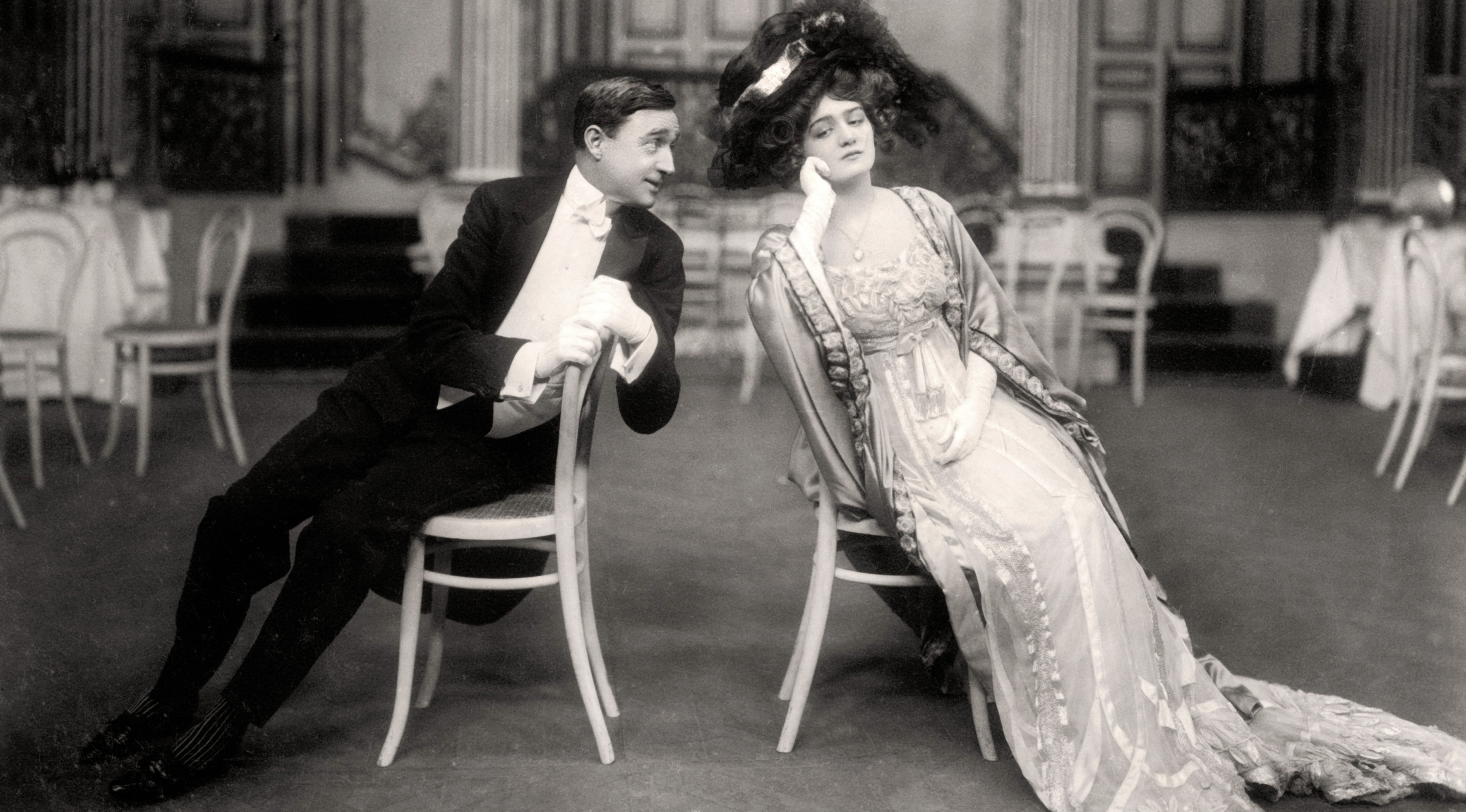
Lily Elsie and Joseph Coyne in “The Merry Widow”, London 1907.
Our production told the story simply and honestly, in our own playing style which is energetic, visually exciting, and bold and theatrical.
Among other things, you introduced cross dressing in HMS Pinafore and Ruddigore: Why was cross dressing once such a popular device, why was it mostly shunned in the 20th century and why do you feel it’s worth reviving the tradition in the new millennium?
That’s not something I have ever really thought about as a principle, it’s really just something we do for expediency. Every actor costs the company a significant part of our budget and so they often have to double and play more than one role. If it involves cross-dressing, in a character role, I never hesitate to do that as a man can often observe female foibles in an amusing and perceptive way. But it is always an acting exercise and nothing ever approaches a celebration of cross-dressing and therefore it is definitely not “drag”. And let’s be clear: we do it both ways; in Pinafore the girls play sailors at the beginning, and similarly in Robinson Crusoe some of the pirates are women. I don’t think I would ever say it’s a tradition – it’s just something we have to do to tell the story with a company of only 7 or 8.
The audience accept it and enjoy it. What may be “modern” about it is that I don’t think modern audiences expect theatre to be “real” any more.
Reality can be done so much more effectively in other media, so let’s celebrate theatrical devices rather than trying to see through them.
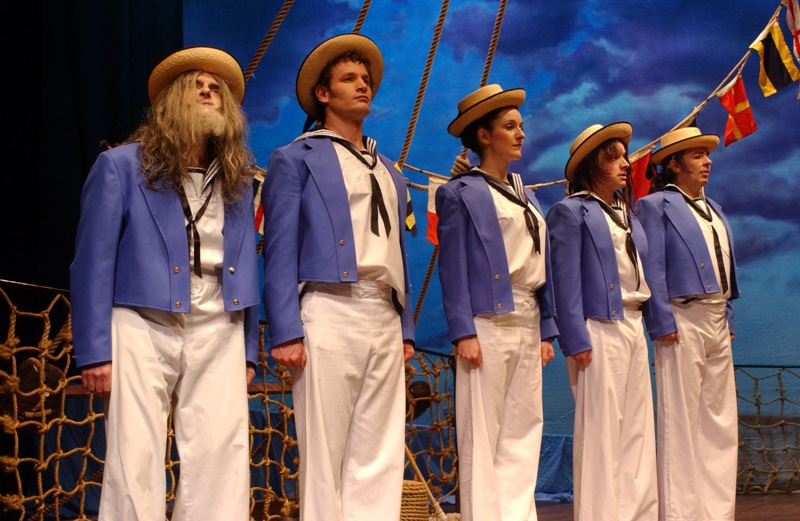
Scene from “HMS Pinafore” with a mixed sailor’s chorus.
There are a lot a breast(s) in your Merry Widow photos. Why is sex, sexuality, nudity and even porn an important part of operetta, in the 19th century and today?
Well let’s be honest and admit to your reading audience that the breasts aren’t real – they belong to the puppets who play the grisettes. Hanna has imported the grisettes from Maxim’s to entertain Danilo in her garden – and possibly to make him realize how shallow such “naughty” entertainment is. In our production rather than importing the real girls to entertain him, she puts on a puppet show and so we can go a little further and have more fun with the life size “girls”.
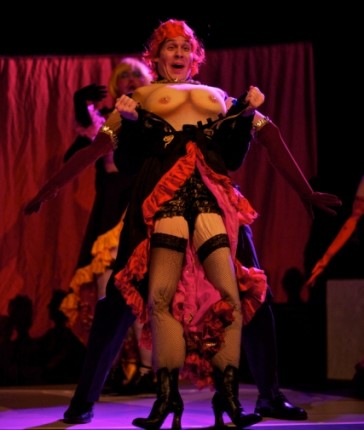
Scene from Opera della Luna’s “The Merry Widow.”
The thing about the most popular operettas is that they are about sex and marital infidelity. Somehow filling the stage with waltzing ball dancers and singing haunting melodies glosses over the fact that the stories are about sexual dalliances ( just as indeed on one level, The Marriage of Figaro is).
It is interesting that Fledermaus and La vie Parisienne are both about husbands trying to be unfaithful to their wives – and failing. But no-one ever points the moral finger, except Offenbach in a very sly and knowing way. What we are encouraged to feel, is that this is how things are. The truth is that we all remain vulnerable to sexual attraction and the energy that such passions can create. If we are married we have to be very careful how we manage that energy. But there is no doubt that it does create energy and that great cities and societies are built on that. Operetta celebrates that energy and the joys of a man pursuing a woman for sex, and vice versa of course, in a way that opera doesn’t. The best operetta plots are not love stories but escapades which highlight or expose the values of the society in which the story occurs.
If, by your reference to nudity you are meaning the scene in our production of “La Belle Hélène” during the long “Am I Dreaming” duet in Act 2, then it seems to me so obvious that that is what Offenbach wanted and would have done if only the authorities would have allowed it.
I didn’t feel it gratuitous at all to allow Helene to remove her clothes and the singer also felt it was clearly what the scene was about. We hadn’t planned it – it came out of rehearsal when we both came to the conclusion that this was so obviously what was meant. Offenbach couldn’t do it; but we could. So we did.
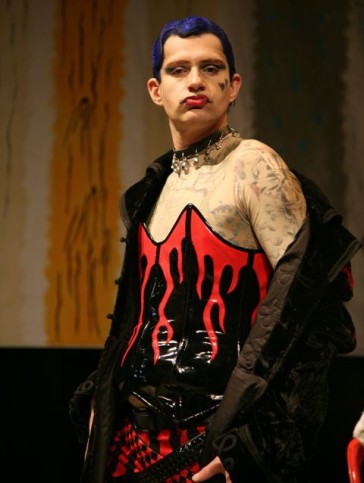
Oliver White as Orlofsky in “Die Fledermaus”. (Photo: Opera della Luna)
Why are “traditional” operetta audiences so afraid of sexual displays?
Well, it depends how they are done. If they are gratuitous – like those terrible productions of Orphée aux Enfers that have can-can dancers coming on at the end turning the Galop into a Moulin Rouge experience, then that is truly awful, and that would certainly make me “very afraid”. I think if the story is told honestly and references to sex are taken at face value and not turned into an operetta giggly moment, then audiences do accept it. That’s our experience any way.
One of your highlights was Robinson Crusoe. What’s special about that show?
The fact that it deals with religion in a way that few of the other opera plots do. People think of the novel as an adventure story and a manual about how to survive on a desert island. But it is much much deeper than that. The novel is a re-evaluation of the values of Western society. As is the opera.
Yes, it is full of comedy and very amusing songs, but it starts with the claustrophobic oppression of Victorian Christianity and ends with Robinson adopting Friday’s much more joyous, liberal, and open view of life.
It is one of Offenbach’s finest pieces, a wonderful score and it remains a mystery to me why it is not more widely performed.
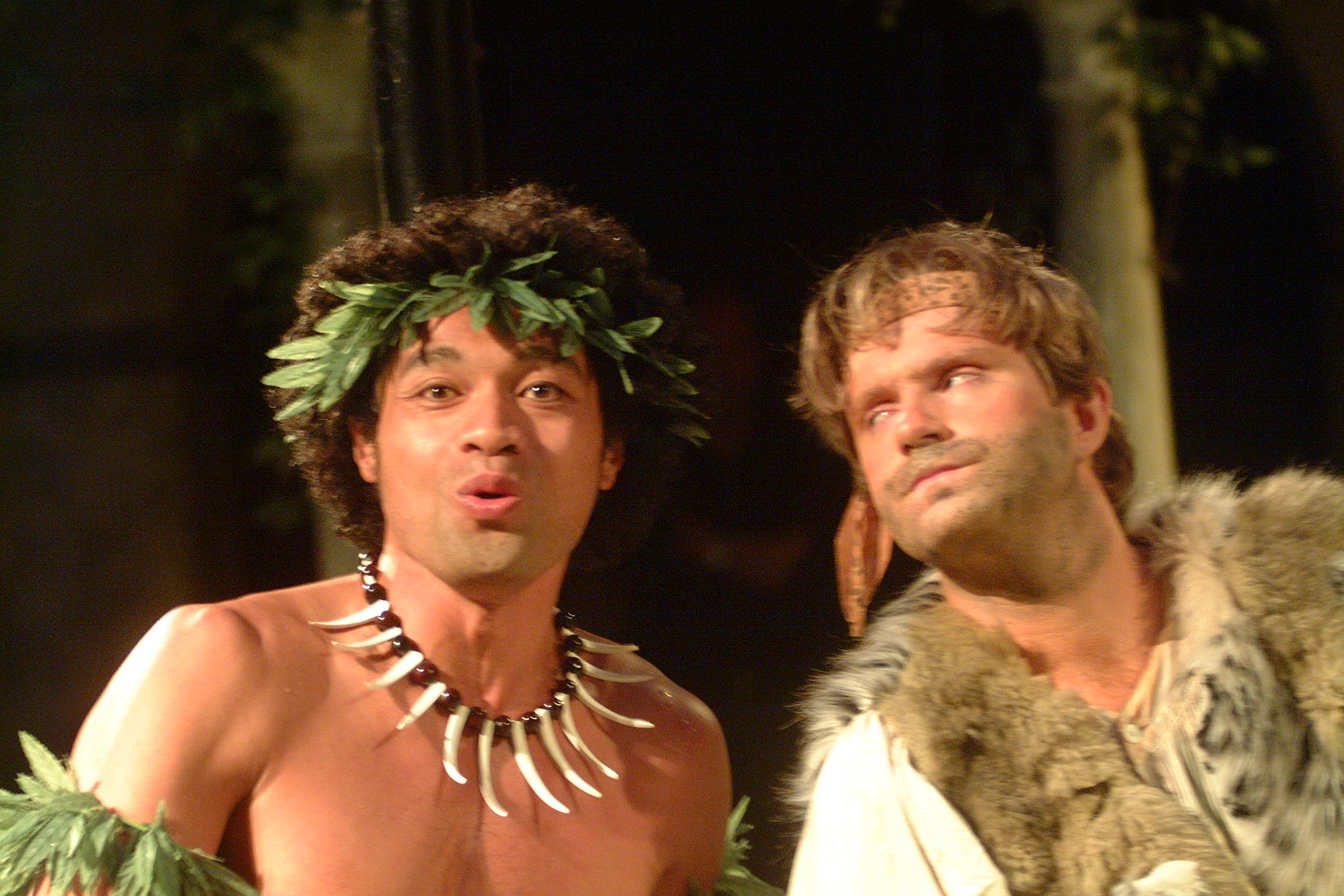
Sani Muliamaseali’i as Friday and Oliver White as Robinson in “Robinson Crusoe.” (Photo: Opera della Luna)
You seem to present adaptations – what’s your goal in adapting operetta? Why not play the original versions – not crazy enough?
No, that’s not it at all; it’s simply the fact that we don’t have a chorus and therefore sometimes have to adapt to make the shows work with a small cast. Our production of The Mikado is played verbatim – all the music, all the lines are there with no cuts or re-writes; but that is the only one where we can get away with performing it with 7 people without having to make any adjustments.
And Fledermaus was actually played virtually with no changes. The only major change was that we cut Frosch. We couldn’t afford to have an actor only performing in one act. And actually the “improvised” scene we created between Eisenstein and Frank, who meet on their way to the gaol, was much funnier than any of the Frosch routines I have ever seen. We heard the voice of Frosch on the entry phone- but we never saw him.
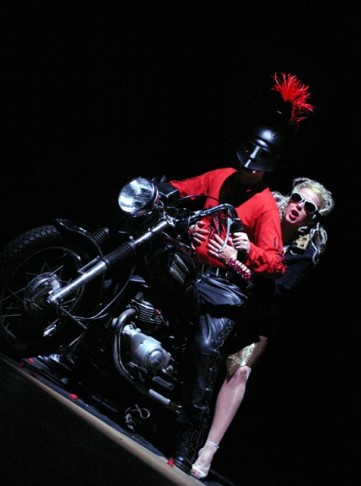
The abduction scene from “La belle Hélène.”
You work in the UK where there is a large musical comedy industry. Does that make casting operettas easier?
Yes and no. Yes in that there are good voices around and a surfeit of people who are always looking for work. No in that young singers at musical theatre colleges are trained to expect to be amplified and wear mics. With us they have to learn how to sing out front and project and it is, at least, amongst actors, a dying art. The core of my company are people who have that skill of being comedians, funny actors, but they can more than put over a song. They are the sort of performers that Gilbert and Offenbach wrote for, but they are becoming more and more a rarity.
If you compare the UK operetta scene with Germany, Austria or the USA, what are the differences, peculiarities and specialties?
I really know very little about Austria. I have seen a few productions at the Volksoper, but not enough to make any generalizations. My impression of German houses is that they largely eschew period productions. They appear to prefer to present shows in a contemporary setting with many references to “now” and tend to favour being more sexually explicit. Sometimes at the expense of wit and charm. The opposite I would say is true of USA where the ball gowns and champagne approach tends to be still in favor.
Opera in general is much more conservative and less adventurous (in terms of production concept) in the States and this is true of operetta too.
I rarely see any operetta on offer in the USA and if it is, it will probably be Widow or Fledermaus (done very “traditionally”), whereas I am fascinated by a lot of the German pieces that we don’t see over here. I would love to be able to do them again over here. My grandmother used to sing songs from a show called The Cousin from Nowhere, which is of course Der Vetter aus Dingsda. There is something very whimsical about that show that I love – I would love to do it here but I am not quite at the stage where I can get away very often with doing a show that no-one has heard of.

Scene from Opera della Luna’s “The Ghosts of Ruddigore” production.
I am interested that your question doesn’t include France. Some of the most exciting things are happening there – with Laurent Pelly and Marc Minkowski’s wonderful re-appraisals of Offenbach, and a splendid company called Compagnie des Brigands – of a similar size to Opera della Luna, also presenting comic operas and operettas that have not seen the light of day for many years.
Are any of your productions available on CD or DVD?
Most of our G&S productions are available on DVD. Fledermaus and Merry Widow are on DVD I think too. We are intending to issue a CD of La Belle Hélène, but we need to get it re-mastered and balanced and it’s just one of those things that we never get round to finishing. I also want to issue our Don Giovanni – as that was something special, and for me Don Giovanni was to date, our finest hour.
I never push our recordings. For me, theatre is a special experience, you have to be there in the same room with the show.
The recordings never appear to do them justice. I like to keep them as a record or as an archive but I don’t like to think of people watching them as I know they won’t be experiencing anything remotely like watching them live. However if your readers want to purchase any, ask them to contact us via our website or send an email to enquiries@operadellaluna.org.
What are your plans for the future? Does “operetta” as an art form have anything to say to a modern audience?
This year we produced La Fille du Régiment which was a succès fou. We set it in California in a Hells Angels type biker gang and the audiences just loved it. We are going to try and tour that and get it out there- both to push our profile but also to try and really get people to come and see it who have never seen an opera before.
We are doing a new production of Orphée aux Enfers next summer and we are excited about that. I think we are unlikely to do any more G&S productions but the ones we have are revived regularly and don’t seem to have aged.
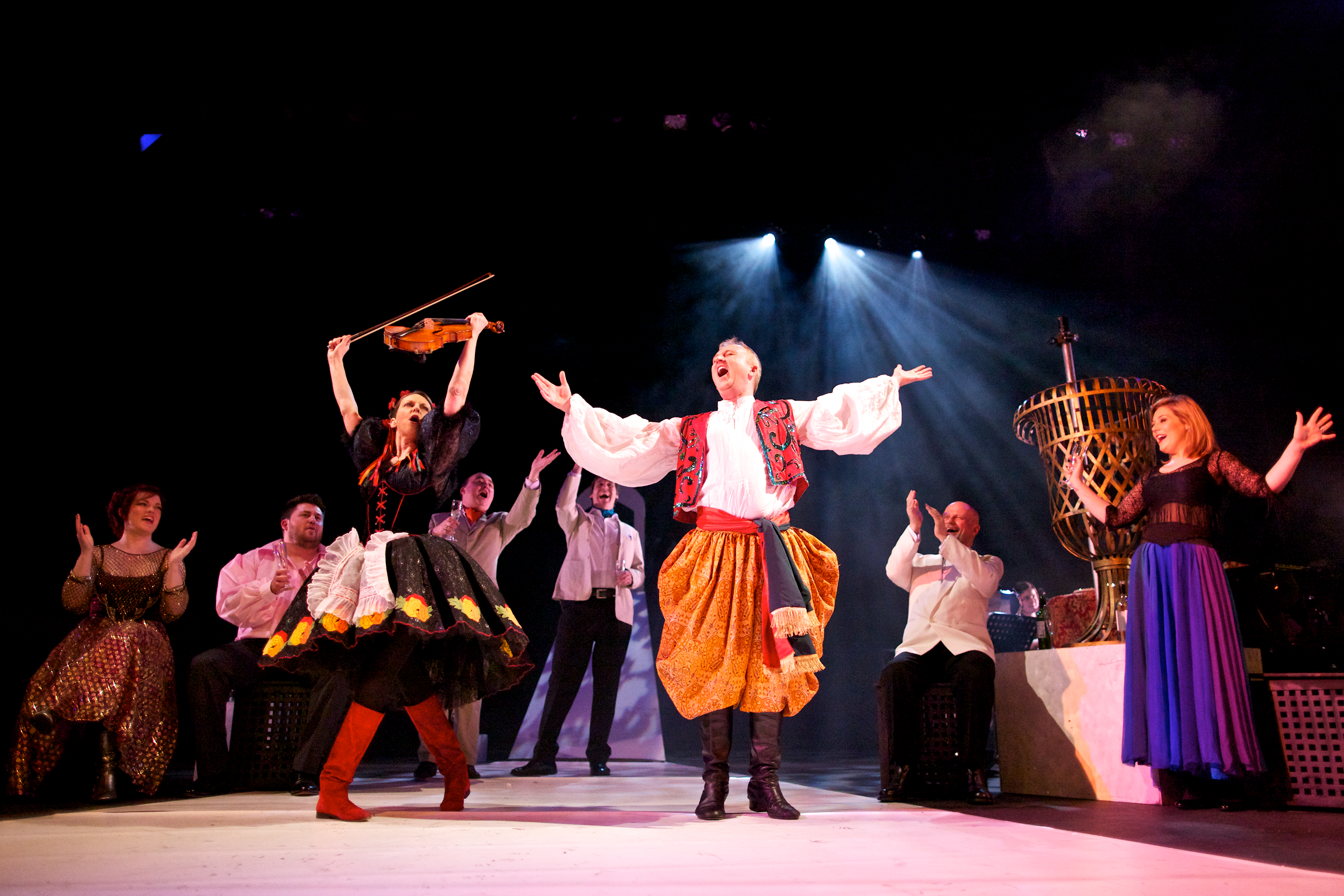
A gypsy flavored scene from Opera della Luna’s “Merry Widow.”
There are many pieces I still want to do – I have mentioned The Cousin from Nowhere. Many of the later Lehar pieces are never done here, although I am worried about their orchestral demands. Kalman is virtually never performed in the UK. Candide is on the cards for 2016.
Yes, I believe operetta stories do have plenty to say to a modern audience, certainly if our experience of Fledermaus and Merry Widow is anything to go by. The music speaks for itself and can be as charming when played by a chamber ensemble as a huge orchestra. If it is honestly sung by people the right age for the roles, who act it sincerely, then a young audience will lap it up.
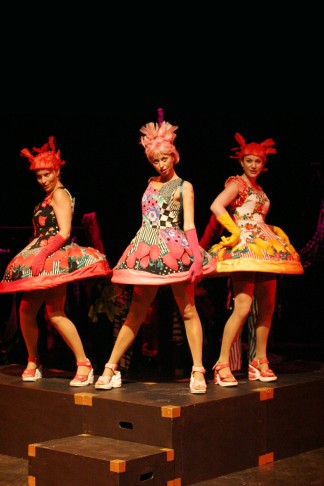
“Three Little Maids” from Opera della Luna’s “Mikado.”
Of late, there has been a revival of burlesque and a rise of boylesque. Does that influence the operetta world?
Probably. It hasn’t influenced my operetta world …. but the theatre is not a museum and if something that is current and popular is appropriate and “works”, then sooner or later someone will create a production around it.
Out of curiosity: What got you hooked on operetta?
Not sure. Just one of those things that floats your boat. I guess it’s a confection of a lot of things I respond to. Good tunes. Real people. Sexy people. Theatricality. Exciting design and stunning costumes (not ball gowns….). And naughtiness.

It’s always interesting to see how different people nominate
different Offenbach shows as being the most underrated. Above, we saw “Robinson Crusoe”. I remember conductor and Offenbach scholar Antonio d’Almeida saying that he couldn’t understand why “Madame L’Archiduc wasn’t done all the time”. I’ve heard the same about “Les Brigands” and “Pont des Soupirs”, “La Princesse de Trebizonde” and “Madame Favart”. Offenbach is clearly someone who engenders that sort of diverse enthusiasm…there are so many gems to choose from, and so many shows that have yet to be well-recorded.
AWESOME!!!!!!